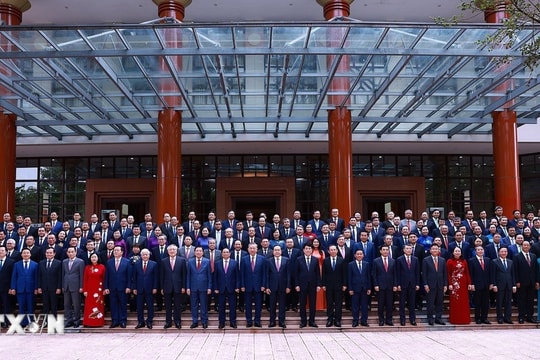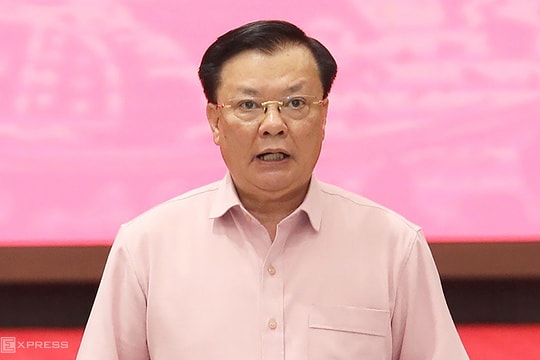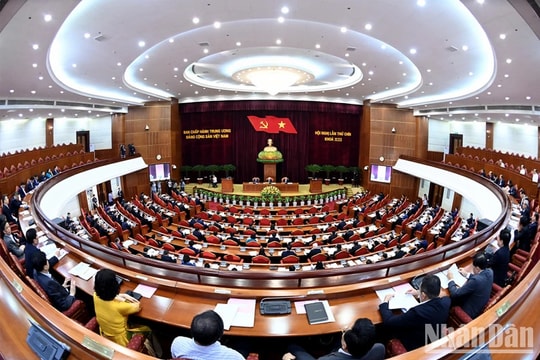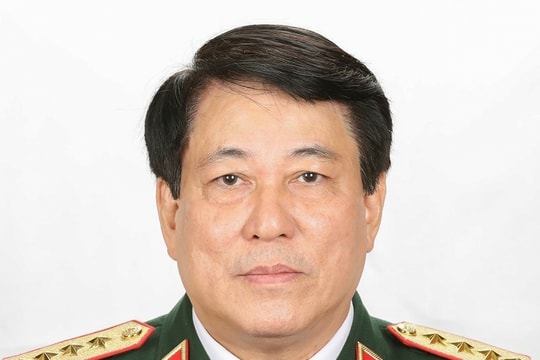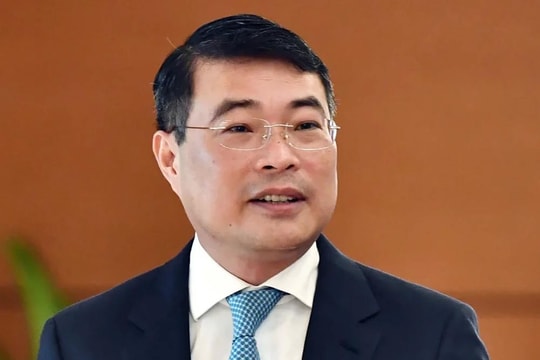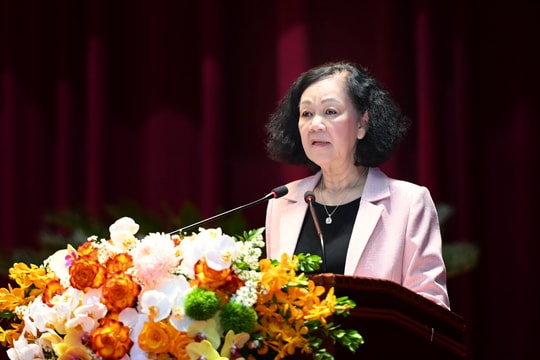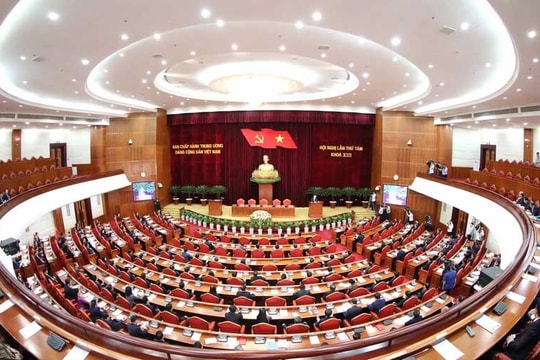Social media for political and social stability in Vietnam
Article by Politburo member, Party Central Committee Secretary, Head of the Central Propaganda Department Vo Van Thuong on social media. Nghe An Newspaper would like to introduce the full text of the article:
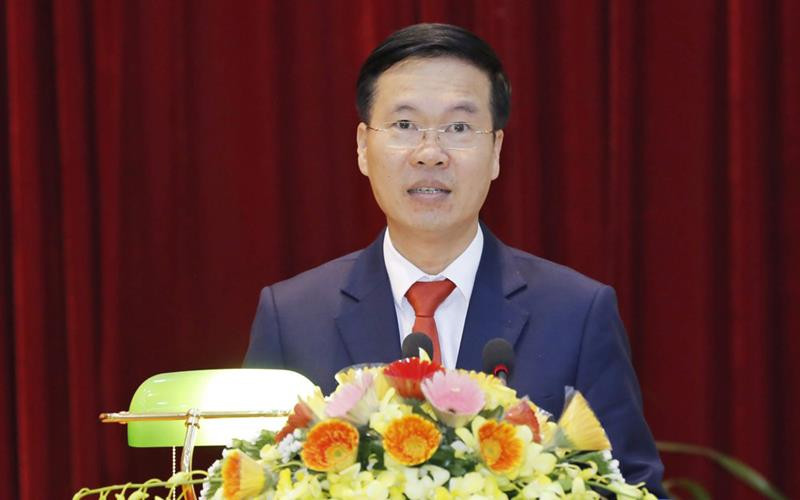 |
| Mr. Vo Van Thuong - Member of the Politburo, Secretary of the Party Central Committee, Head of the Central Propaganda Department. |
"1. In late 2018, sparked by a video of an accordionist expressing his dissatisfaction with tax policies posted on social media, the protests called the "Yellow Vest Movement" have caused a continuous crisis in France for the past time. The movement spread rapidly because the calls spread on social media fueled anger, far beyond the original goal of inciting protests to oppose policies, becoming riots.
Looking back at the “color revolutions” or violent protests with a modernized “color revolution” feel in recent decades, we can easily see that it was social media that ignited, fanned with incitement, organization and information, causing what were initially street movements to turn into violence and the result was the rapid weakening of regimes such as in Eastern Europe, the Middle East, North Africa, and Latin America.(1).
Social media and fake news have become keywords that make many people think of the violent street protests that have made Europe and the world restless in recent times. Even in the US, after the Occupy Wall Street protests (in 2011), politicians have specifically criticized Facebook and Twitter as "tools of riots". Western press has also summarized the methods of using social media to create "crowds" to incite, which are: igniting the flames of street protests; thoroughly exploiting incidents, accidents, and deaths to create pretexts for riots; using mobile phones and social networks to incite and connect internally and externally.(2).
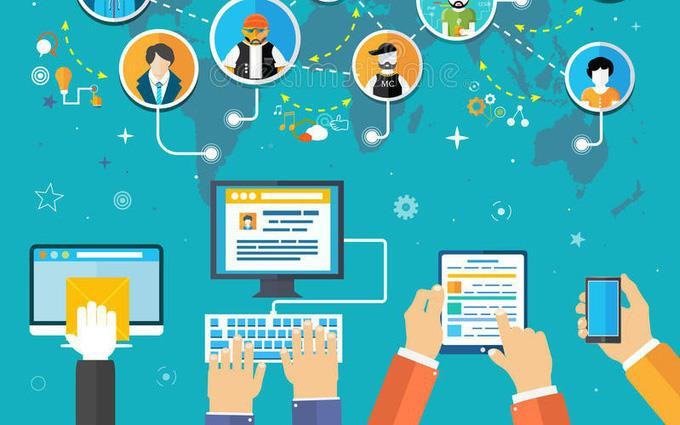 |
| Social media platforms reveal negative impacts, hidden complex and unpredictable risks. (Illustration photo, source Internet) |
Social media is an “information flow” on a technology platform and service that allows users to create, share, exchange, discuss and change content, establish networks of connections and social interactions.(3). Social media, especially social networks, are constantly supported and assisted by new technologies, becoming more and more convenient, becoming an important channel, promoting the process of communication and social connection. Algorithms allow social media platforms to establish communities operating in many different forms (forums, groups, public or secret associations...) that can attract from thousands to millions of members, without geographical or social limitations. Access to each individual user at a fast speed creates many opportunities and benefits in transmitting, receiving, sharing, information, and knowledge; serving the diverse needs of the community such as: making friends, entertainment, business, expressing opinions, social criticism, spreading good things... At the same time, social media platforms also reveal negative impacts, containing complex and unpredictable risks, even capable of causing deep divisions and inciting hatred in social communities, especially in multi-ethnic and multi-religious countries.
Yuval Noah Harari does not exaggerate the global anxiety when he argues that the Internet and social networks “are a land of freedom and lawlessness that erode national sovereignty, ignore borders, destroy privacy and pose arguably the most terrifying global security threat.”(4)With its multidimensional impacts, cyberspace can be seen as the “fifth war zone”.(5), where social media plays the role of a "power", surpassing mainstream media, challenging the administrative and technical management measures of all countries, especially developing countries. Large revenues from social media are still flowing to developed countries with high technology levels, personal data is in the hands of a few foreign technology giants, threatening the economy, law, security, and sovereignty. Some people compare Facebook to a large "country" and certainly have more information about its "citizens" than any government. When "online data" is a resource, information is power, then we have grounds to worry that those who hold the "information ownership" will "create many new risks, while amplifying other risks"(6). The data scandal caused by Cambridge Analytica, a political data analysis company, illegally accessed and “poisoned political information” to 87 million users, is an expensive lesson that makes the question: “How to manage information ownership?” become “the most important political question of our era”.(7).
Faced with existing challenges and potential risks that require rethinking the model and way of governing cyberspace, countries are rushing to establish protective barriers by introducing tough measures. Because, “The right to decide on public policy issues related to the Internet is the sovereignty of countries.”(8)Germany has passed a law on social network management (NetzDG), according to which social network services that allow users to insult, cause hatred or spread fake news will face heavy fines of up to 50 million Euros. Australia announced that it will fine network service providers and social network sites up to 10% of their total annual income, and even jail for up to 3 years for operators who do not completely remove bad content. Egypt's anti-fake news law allows authorities to monitor personal accounts on social networks with more than 5,000 followers. Thailand's Cybersecurity Law stipulates that those who spread fake news will be sentenced to 7 years in prison. The Philippines also recently issued a law stipulating that spreading fake information is considered a criminal offense, punishable by up to 6 months in prison and a fine of more than 3,000 USD. Meanwhile, Singapore has just passed the Protection from Online Deception and Manipulation Bill. Those who spread fake news with malicious intent, causing serious harm to the public interest, can face a sentence of 10 years in prison, and social media companies that do not comply with the regulations can be fined up to 1 million Singapore dollars.(9)...
2. In the context of increasing instability in many parts of the world, Vietnam's political and social stability is an important advantage for development. Thanks to the consistent viewpoint: "Stability and development are closely linked in the process of movement, progress, stability for development and only with development can there be stability"(10)With a stable political and social environment, security and safety maintained, the country's internal strength aroused and promoted, and external strength received and used effectively, after more than 30 years of renovation, the country has achieved great achievements of historical significance. Vietnam has become an attractive destination for investors and tourists, a meeting place for the aspiration for world peace.
Political and social stability depends on internal and external factors. In which, the core factor is "people's peace", solidarity and consensus, and social trust. In the process of building and defending the country, wise kings always considered "people's peace" as a "deep-rooted and strong-rooted plan", "only when the roots are strong will the tree be at peace", and only then will the country be stable and sustainable. The rich practice of the Vietnamese revolution since the Party was established shows that "people are the root" is the guiding ideology, governing the Party and State's guidelines, policies, and activities; it is one of the great lessons in the Party's leadership. Constantly caring for and improving people's lives, cultivating the flesh-and-blood relationship between the Party and the people, and strengthening people's trust in the Party's leadership are the foundation for the political and social stability of our country in recent times. However, the “peace of mind” or the people’s trust, confidence, and social consensus are always challenged and constantly changing in the flow of world affairs, current events, and historical collisions. This year it may be like this, next year it may be different with many intertwined factors and levels of influence. In which, the press, media in general, and social media in particular, play a very important role.
After more than 20 years of Internet presence (since 1997), with more than 60 million users, Vietnam is the 18th country in the world in terms of Internet usage rate and is one of the 10 countries with the highest number of Facebook and YouTube users in the world. This shows Vietnam's openness and dynamism in the process of integration with the digital world.
Like other countries around the world, Vietnam is exploiting and promoting the superior characteristics of social media, while at the same time, it is also facing negative impacts that are difficult to control from this new form of media.
It can be seen that the social network "ecosystem" has formed a class of KOLs (Key Opinion Leaders), influencers who are "branded" people or "ordinary people" whose information and opinions are attractive, influential, shared by "netizens", and quickly spread on a wide scale. They are mostly active subjects contributing to creating a healthy information life. However, there have also been exposed KOLs and influencers with impure motives, low cultural background, dissatisfaction with the regime, and even violations of the law, but know how to "evoke bad emotions"; abuse words, have illusions of "keyboard power", always find ways to direct public opinion; attack businesses for profit; threaten and insult individuals and organizations... Some are nurtured and distributed by hostile organizations outside. Taking advantage of shortcomings in state management of the Internet and social networks, they infiltrated social media platforms, "raised" nicks (account names), created hundreds of thousands of fake accounts and many fake pages of individuals and organizations.
With many sophisticated tricks supported by technology, they focus on destroying the ideological foundation, denying the achievements of the renovation process, demanding the abolition of the leadership role of the Communist Party of Vietnam, spreading extremist ideology, creating disagreements and conflicts within the Party and the people. They exaggerate the limitations and shortcomings in leadership and management to deepen conflicts of interest, divide society, reduce trust, carry out "peaceful evolution", and demand the overthrow of the regime. From there, they attract, gather forces, incite illegal protests, opposition, riots, seriously affecting security and social order such as in the cases of exploiting environmental issues at Formosa Ha Tinh, protesting the Draft Law on Special Administrative-Economic Units, the Law on Cyber Security, etc.
There is a phenomenon of KOLs and influencers receiving "impure" support from leaked confidential information within Party and State agencies, not excluding the extremely dangerous "handshakes with the underworld" of corrupt officials, political opportunists, and full of personal ambition. The use of social media by politicians as a tool to communicate with the public, build their image or campaign for political purposes is not new in the world and can be encouraged in Vietnam, but it needs to be established as one of the principles of public and transparent political conduct. As for "colluding" with social media factors to create "waves" in public opinion, for personal intentions and motives, it is unacceptable.
Distorted perceptions of political, economic, cultural and social issues will lead to behavioral errors, creating security risks and political and social instability. A segment of social media users in Vietnam often tend to pay attention to, like and share sensational, negative and contradictory information more than positive information, intentionally or unconsciously, regardless of the consequences. Many people believe that social media is virtual and they are not responsible for their statements and actions. That mentality, combined with the tools created to attract social media users, along with the inadequacies and limitations in management by authorities, makes the dissemination of bad and toxic information easier and more dangerous.
Recent studies have shown that the phenomenon of fake news, hate speech, defamation, slander, fabrication, ethnic, religious, gender discrimination, aggressive behavior, online attacks, etc. is becoming alarming.(11)These deviant behaviors can cause crisis in the lives of individuals and organizations, causing serious social depression, and even "internet storms" can "kill" businesses. Some individuals have chosen death as a way out.
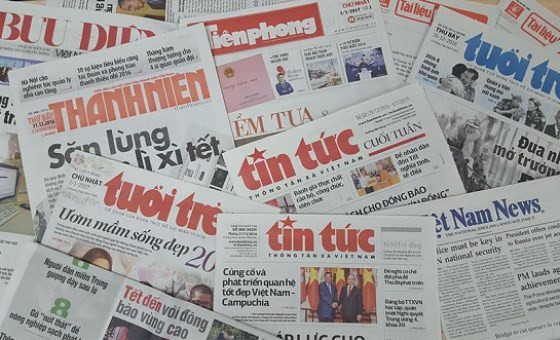 |
| Promote the proactive, pioneering, leading and orienting role of the press in providing positive information. |
The negative impact of social media can lead to direct, immediate consequences, but there are also long-term, insidious consequences that accumulate in behavior and lifestyle, gradually destroying good cultural and ethical values. The breakdown of values and psychological trauma affects each individual's life, thereby affecting the political and social stability of the country. Sociologists believe that spending too much time online leads to "isolation from real society", "neglect of real-life relationships", "believing in it without spending time on observations, experiences and real interactions to make the right decisions", even distorting perception, leading to illegal acts, especially among young people. In the long run, it can cause deep cracks in social cohesion, causing disintegration, making it difficult to create consensus in working together to solve problems of the community, the country or humanity.(12).
3. There are opinions that social media has passed its peak and is slowing down. There are optimistic assessments that social media users are gradually becoming more clear-headed, calmer, equipped with better filters, and more experienced after being fooled by fake news many times. But in reality, it can be affirmed that social media is an increasingly complex and expanding "front" that hostile forces are exploiting to promote "color revolution elements in Vietnam".
Lessons from the “color revolutions” show that we cannot be subjective or negligent, but need to proactively identify and promptly prevent factors that take advantage of social media to influence political and social stability from many directions and in many different ways. This requirement requires a correct view of social media in both positive and negative aspects, identifying and managing influential factors to protect and promote progressive values recognized by society, while limiting, repelling and eliminating negative impacts with strong, synchronous and effective solutions.
One isIn leadership and direction, it is necessary to continue to thoroughly grasp and correctly and fully perceive the viewpoint: "constantly innovate leadership thinking, direction and management of electronic newspapers, social networks and other types of media on the Internet to keep up with the development of Internet technology,... proactively and persistently promote development in the right direction along with strict management"(13).
Clearly, this is an open, unique, and especially important environment located alongside the information flow of traditional media that needs to be exploited to the maximum in terms of positive aspects, promoting progressive values, orienting and fighting against wrong perceptions, thoughts and viewpoints. Therefore, it is necessary to proactively assess and accurately forecast the situation; focus on thoroughly resolving pressing issues of the people; effectively overcome limitations and shortcomings, and not let "hot spots" and negative trends form on social networks. The authorities need to provide information to the press in a complete, public, transparent and timely manner, especially on important issues that the people are interested in, not allowing hostile forces to take advantage of and dominate social media.
At the same time, strictly maintain information discipline, resolutely fight against and severely handle political opportunists, "self-evolutionists", "self-transformators" who deliberately leak and provide internal information, support social network elements to spread false news, incite and attack internal affairs.
Two is, urgently institutionalize, enhance the effectiveness and efficiency of management in practice; actively build a scientific and progressive legal framework for social media to operate and develop healthily and in the right direction. In recent times, the rapid changes in algorithms of technology platforms have "made it difficult" both in terms of perception and action, making the authorities, who are already slow and limited in managing cyberspace, even more confused, inadequate, and unable to keep up with the planning of policies and laws for social media. To manage well, it is necessary to quickly continue to complete and synchronize the system of legal documents with specific, clear, realistic, and appropriate provisions, keeping up with the pace of changes in social media... instead of just stopping at the regulatory rules of ethical and cultural recommendations. Because when legal constraints are not specific, clear, and strong enough, ethical and cultural rules are also very difficult to put into practice.
Persistently maintain the principle that network operators, service providers, service operators, especially cross-border service providers, must be responsible for complying with Vietnamese laws, respecting Vietnam's sovereignty, interests, and national security. Require partners to demonstrate cooperation and comply with regulations when entering Vietnam, such as setting up representative offices, establishing user legitimacy in account registration, actively coordinating to promptly remove pages impersonating Party and State leaders, completely deleting accounts that provide false information, etc.
It is necessary to pay more attention to economic measures, requiring the responsibility of businesses to be commensurate with the benefits they enjoy. Actively implement the Law on Cyber Security with sanctions strong enough to deter and handle violations and harmful acts such as storing, providing, posting, spreading fake news, untruths, distortions, slander, defamation, incitement, and sabotage of the Party and State on the Internet and social networks...
Three is, promoting the proactive, pioneering, leading and orienting role of the press in positive information. Revolutionary press needs to further affirm its role and position in the digital age. The positive information flow of the press must still be the mainstream information flow with quality, accurate, timely, objective information, and be a reliable filter on all social issues and public concerns.
Therefore, it is necessary to promptly summarize and evaluate the results of implementing the 2016 Press Law, amend, supplement and complete the Law as well as sub-Law documents to further improve the legal environment for press activities. Clearly define criteria for each type of electronic information, especially electronic newspapers, electronic magazines, general electronic information sites, and social networks; have regulations to regulate the activities of technology companies specializing in providing press information. Strengthen the responsibility of the governing body and press agencies in implementing the principles, purposes and content of information, in cooperating in press activities, and in investing in digital technology platforms for the development of the press.
Immediately implement the approved press planning in 2019, review and re-issue or revoke operating licenses for organizations and agencies that have recently loosened management and committed many violations in press activities. Strengthen training and fostering of journalists in political capacity, professional capacity, technology, ethics, awareness of professional mission, and good implementation of regulations on responsibilities and standards when participating in social networks.
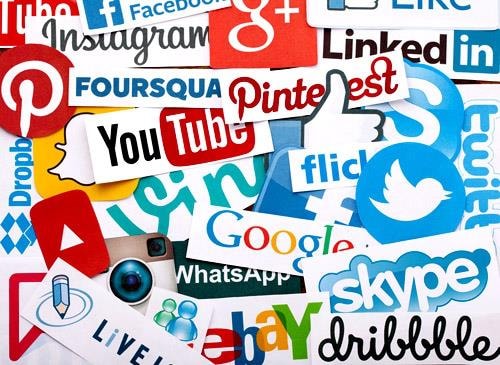 |
| It is necessary to focus on strengthening propaganda measures to improve legal understanding, awareness and responsibility when participating in social media platforms of all citizens. Photo: Internet |
Four is, promote appropriate technological solutions and technical measures to keep up with the development of the Internet and social networks. Encourage the development of domestic technology-based social networks, and encourage domestic agencies and organizations to build internal social networks. Strengthen the application of technology to prevent, detect, and promptly handle false, bad, and toxic information that affects political and social stability. Improve the capacity to analyze, investigate, and research the public, measure the attitudes of Internet users, and participate in social media on issues of public concern.
Five is, social media is different because of user-generated content and highly personalized information, so State management is necessary, but the most important thing is still user awareness. It is very important for users to improve their "resistance", equip themselves with legal knowledge, good cultural filters, behave civilly and politely in debate and criticism, have news capacity, and be able to evaluate the reliability of information on social media. Only then will the exploitation and use of social networks be effective, practical and healthy, and users can protect their own values, those of the community and the nation.
Therefore, it is necessary to focus on strengthening propaganda measures to improve legal understanding, awareness and responsibility when participating in social media platforms of all citizens. Provide value-oriented education so that young people know how to avoid cognitive and behavioral deviations; equip students with skills to protect personal information, and how to filter and receive information.
Promote the role of organizations and individuals, especially website operators, blogs, fanpages, KOLs, influencers, and young people in building a healthy Internet and social network environment. Each cadre, party member, union member, and association member participating in social networks must play the role of a core force in posting, sharing, and spreading positive information and consider this a regular, long-term solution.
Vietnam is a country with stable politics and society and is on the way to development, however, there are still potential risks of instability. Creating a healthy and safe information environment, in which social media is one of the important information resources, will contribute positively and effectively to protecting and preserving a stable political and social environment as a foundation for the country's sustainable development./.
-----------------------------------
(1) From the “Velvet Revolution” in Yugoslavia in 2000, the “Rose Revolution” in Georgia in 2003, the “Orange Revolution” in Ukraine in 2004, the “Tulip Revolution” in Kyrgyzstan in 2005, the “Jewel Revolution” in Belarus in 2006, especially the “Arab Spring” in Tunisia, Egypt in 2010 spreading to Libya, Syria in 2011, to the recent political and social upheavals in Greece, Venezuela, Turkey, Spain, Austria, France... all have the impact of social media.
(2) Department of Propaganda, General Department of Politics of the Vietnam People's Army, Center for Military Scientific Information, Ministry of National Defense: Dangers from the dark side of the Internet, National Political Publishing House - Truth, Hanoi, 2016, p.50.
(3) Scientific conference on the State-level topic KX.01.10/16-20: Social networks in the context of information development in Vietnam.
(4) Yuval Noah Harari: A Brief History of the Future, World Publishing House, Hanoi, 2018, p.445.
(5) Besides the earth, sky, sea and universe.
(6) Jean Tirole, Nobel Prize-winning economist: Managing the agents of disruption, Forecast 2019, The Great Upheaval, VNA, Project Syndicate, Hanoi, 2018, p.92.
(7) Yuval Noah Harari: 21 Lessons for the 21st Century, Jonathan Cape, London, 2018, p. 80.
(8) United Nations: Declaration of Principles on Building the Information Society: A Global Challenge for the New Millennium, Paragraph a, Article 49 (WSIS-03/GENEVA/DOC), World Summit on the Information Society, Geneva, 12 December 2003.
(9) According to Nhan Dan Electronic: The fight against fake news and violent content on social networks, April 10, 2019 (http://www.nhandan.com.vn/thegioi/item/39805002-cuoc-chien-chong-tin-gia-va-noi-dung-bao-luc-tren-mang-xa-hoi.html); According to Vietnamnet.vn: Singapore: Anti-fake news law makes social network users cautious, May 14, 2019 (https://vietnamnet.vn/vn/cong-nghe/tin-cong-nghe/singapore-luat-chong-tin-gia-khien-nguoi-dung-mang-xa-hoi-phai-can-trong-531604.html)...
(10) Communist Party of Vietnam: Documents of the National Congress of Delegates in the Renovation Period (Terms X, VII, VIII, IX, X), National Political Publishing House, Hanoi, 2010, PI, p.40.
(11) According to a survey by the Internet and Society Research Program (VPIS) of the University of Social Sciences and Humanities, Vietnam National University, Hanoi (2017).
(12) Author group Nguyen Hoai Son, Le Quang Ngoc, Nguyen Quang Tuan, Nguyen Duc Vinh, Institute of Sociology, Vietnam Academy of Science and Technology: Some aspects of social change in the context of the fourth industrial revolution, (http://www.haiphong.gov.vn/PortalFolders/ImageUploads/SKHCN/12/Cong%20nghiep%204.0/Bien%20doi%20xa%20hoi%20trong%20CMCN%204.0.pdf).
(13) Directive 30-CT/TW of the 10th Politburo dated December 25, 2013 on "Developing and strengthening the management of electronic press, social networks and other forms of media on the Internet".

